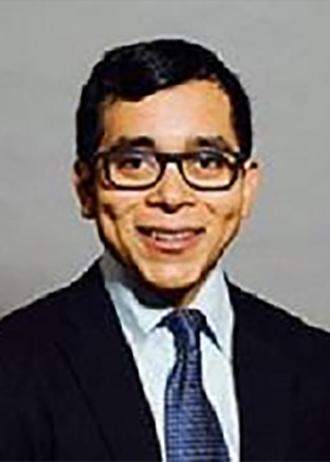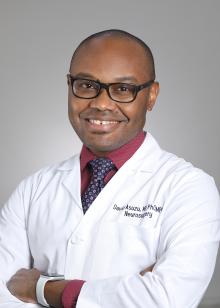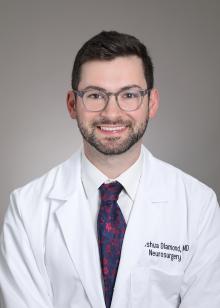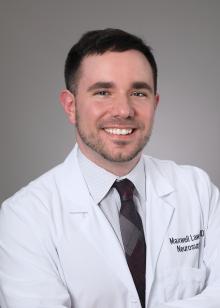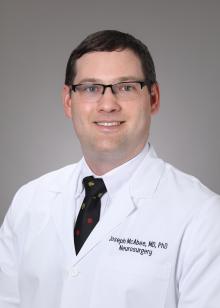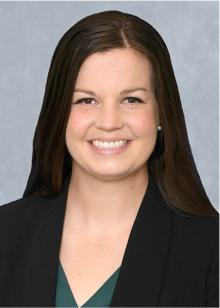Overview
The Surgical Neurology Branch of the National Institutes of Neurological Disorders and Stroke at the National Institutes of Health (NIH) offers an innovative 7-year, ACGME-accredited Neurological Surgery Residency Training Program in collaboration with Georgetown University.
The NIH Clinical Center, Georgetown University Hospital, Washington Hospital Center, and Children’s National Medical Center are clinical training sites for the first 3 years of residency training (PGY1, PGY2, and PGY3). Four full-time neurosurgical faculty members mentor NIH clinical training. Residents then spend 2 years at the NIH in dedicated research training (PGY4 and PGY5). During the senior resident clinical rotation (PGY6), the resident manages the neurosurgery inpatient service and participates in complex operative cases. The final residency year (PGY7) is a chief residency on the busy neurosurgery services of Georgetown University Hospital and Washington Hospital Center. The chief resident gains essential experience treating diverse neurosurgical conditions.
Research training will take place at the NIH. Residents can work either within the Surgical Neurology Branch or call upon the NIH intramural research program's significant resources to identify a research project. Specific emphasis will be placed on preclinical research and the design of a prospective clinical research protocol to be completed during the training period. Trainees acquire the clinical and research knowledge and skills necessary to become future clinician-scientists and leaders in neuroscience through this curriculum.
For additional information please view our brochure: Neurosurgery Residency Program Information(pdf, 1693 KB).
Application Information
One position is open for appointment each year. The department specifically selects residents with a demonstrated interest in and aptitude for careers in academic neurosurgery. After the review of completed applications, qualified candidates will be invited to meet our staff and residents.
Interviews will be conducted in-person.
For additional information on the application please contact the Residency Program Coordinator.
Rotation Schedule
YEAR |
JULY - DECEMBER |
JANUARY - JUNE |
|---|---|---|
|
PGY-1 |
General Neurosurgery and |
Neurotrauma-MedStar Washington Hospital Center (2 months) General Surgery- National Institutes of Health (1 month) |
|
PGY-2 |
Spine Rotation-MedStar Georgetown University Hospital (3 months) |
Spine Rotation-MedStar Georgetown University Hospital (3 months) |
|
PGY-3 |
Pediatric Neurosurgery Rotation-Children's National Medical Center (4 months) |
Spine Rotation-MedStar Georgetown University Hospital (2 months) Cranial Rotation-National Institutes of Health (4 months) |
|
PGY-4 |
Research Rotation- National Institutes of Health (80% Research Time; 20% Clinical Time) |
Research Rotation- National Institutes of Health (80% Research Time; 20% Clinical Time) |
|
PGY-5 |
Research Rotation- National Institutes of Health (80% Research Time; 20% Clinical Time) |
Research Rotation-National Institutes of Health (80% Research Time; 20% Clinical Time) |
|
PGY-6 |
Senior Clinical Rotation-National Institutes of Health (10% Research Time; 90% Clinical Time) |
Senior Clinical Rotation- National Institutes of Health (10% Research Time; 90%Clinical Time) |
|
PGY-7 |
Chief Resident-MedStar Georgetown University Hospital (6 months) |
Chief Resident-MedStar Georgetown University Hospital (2 months) Chief Resident-MedStar Washington Hospital Center (4 months) |
Clinical Opportunities
Overview
Our Neurological Surgery Residency Program is designed to provide residents with comprehensive and diverse clinical experiences, ensuring a strong foundation in neurosurgical practice. With affiliations with prominent medical institutions, residents gain exposure to a broad spectrum of cases and benefit from mentorship by experienced neurosurgical faculty.
- Clinical and Scholarly Activities Integration:
Throughout the entire residency period, robust clinical and scholarly activities are integrated into the curriculum, emphasizing the importance of combining clinical excellence with scholarly pursuits. Key features include: - Case Discussions and Conferences:
Regular case discussions and conferences provide a platform for residents to engage in collaborative learning, share experiences, and stay updated on the latest advancements in neurosurgery. Please see our conference schedule (link). - Journal Clubs:
Participation in journal clubs enhances critical thinking and keeps residents informed about current research trends, contributing to a well-rounded education. - Mentorship:
Residents benefit from mentorship by experienced neurosurgical faculty members, ensuring personalized guidance and support throughout their clinical training.
Our structured and progressive curriculum ensures that residents traverse a diverse clinical landscape, evolving their surgical prowess, and exploring the depths of various neurosurgical specialties. Each year adds a new layer to their expertise, preparing them to emerge as leaders in the field of neurosurgery.
|
PGY-1 (NIH, WHC, and GUH): |
|---|
|
In the inaugural year of our residency program, residents embark on a comprehensive journey to cultivate the essential skills and knowledge required for neurosurgical excellence:
|
| PGY-2 (WHC and GUH): |
|---|
|
The second year marks a transformative phase, emphasizing the continuity of care and refining surgical skills. Residents undergo:
|
| PGY-3 (NIH, GUH, and CNMC): |
|---|
|
In the third year, residents further advance their skills and explore areas of specialization, marked by:
|
| PGY-6 Senior Clinical Residency at NIH: |
|---|
|
The senior year at the NIH Clinical Center is a pivotal moment, characterized by leadership and independent practice. Residents take on:
|
| PGY-7 Chief Residency (GUH & WHC): |
|---|
|
The final year as Chief Resident represents the zenith of expertise, leadership, and administrative acumen. This year encapsulates:
|
Research Opportunities
Overview
At the heart of our Neurological Surgery Residency Program is a robust commitment to advancing neurosurgical knowledge through cutting-edge research. Residents have unparalleled opportunities to engage in transformative research experiences, foster collaboration, and contribute to groundbreaking discoveries. The Neurological Surgery Residency Program at the NIH offers a unique blend of dedicated research time, collaborative environments, and flexibility in research focus, creating an environment where residents can thrive as clinician-scientists and leaders in neurosurgery.
Dedicated Research Training (PGY4 and PGY5)
Residents immerse themselves in an intellectually stimulating environment during the dedicated research phase at the National Institutes of Health (NIH). This period is designed to provide a solid foundation in basic, translational, and clinical research.
Key Features:
- Mentorship: Residents work closely with neurosurgical faculty members within the Surgical Neurology Branch, leveraging their expertise to shape their research endeavors.
- Intramural Research Programs: Residents can tap into the vast resources of the NIH Intramural Research Programs, allowing them to identify and pursue research projects aligned with their interests.
- Preclinical Research: Emphasis is placed on engaging in preclinical research, contributing to a deeper understanding of neurosurgical conditions at the molecular and cellular levels.
- Clinical Research Protocol Design: Residents are actively involved in the design of prospective clinical research protocols, preparing them for a future where they can seamlessly integrate research into their clinical practice.
- Grant Writing: Residents receive dedicated support for grant writing training. Our program offers access to the prestigious SNS RUNN Course (Society of Neurological Surgeons Research Update and News Network) and NIH Grant Writing Workshops, providing invaluable insights and skills for securing research funding post-residency.
Collaborative Research Environment
The NIH provides an unparalleled collaborative environment, fostering interaction between various research disciplines. Residents have the opportunity to collaborate with scientists, clinicians, and experts from diverse fields, creating a rich tapestry of expertise.
Highlights:
- Multidisciplinary Approach: Residents can collaborate with professionals from fields such as neurology, radiology, pathology, and more, enhancing the breadth and depth of their research.
- State-of-the-Art Facilities: The NIH offers access to state-of-the-art research facilities and cutting-edge technologies, providing residents with the tools needed to conduct innovative and impactful research.
- Networking Opportunities: Regular seminars, conferences, and workshops create an environment conducive to networking, ensuring residents stay connected with the latest advancements in neurosurgical research.
Flexibility in Research Focus
Whether residents choose to focus on basic science, translational research, or clinical studies, our program encourages and supports diverse research interests.
Areas of Interest Include:
- Neuro-Oncology
- Neurotrauma
- Neurodegenerative Disorders
- Spinal Disorders
- Functional Neurosurgery
- Pediatric Neurosurgery
Publication and Presentation Opportunities
Residents are encouraged and supported in disseminating their research findings through publications in reputable journals and presentations at national and international conferences.
Benefits:
- Visibility: Residents gain visibility within the academic and scientific community, establishing themselves as contributors to the field of neurosurgery.
- Skill Development: Presentation opportunities enhance residents' communication skills and the ability to convey complex scientific ideas effectively.
Current Residents
PGY- 7 UVA Chief Resident
PGY- 6 NIH Chief Resident
PGY- 5 Research/Junior NIH Resident
PGY- 4
PGY- 3
PGY- 2
Alumni
| Graduation Year | Program Graduate | Current Position |
|---|---|---|
| 2017 | Gautam Mehta | U.S. Food and Drug Administration |
| 2018 | Winson Ho | Assistant Professor, Neurosurgery, University of California San Francisco |
| 2019 | Alexander Ksendowsky | Assistant Professor, Department of Neurosurgery at the University of Maryland Medical System |
| 2020 | Dominic Maggio | Neurosurgeon at Legacy Spine & Neurological Specialties |
| 2022 | Panagoitis (Panos) Mastorakos | Assistant Professor, Neurosurgery, UT Southwestern Medical Center |
| 2023 | Isaac Jonathan (Jon) Poemeraniec | Stereotactic and Functional Neurosurgery Fellowship, Penn State College of Medicine |

